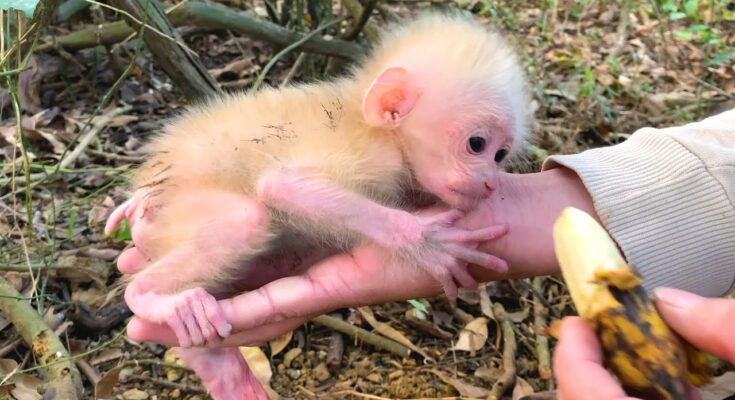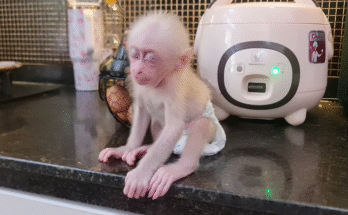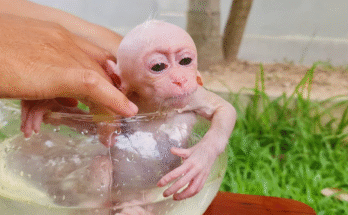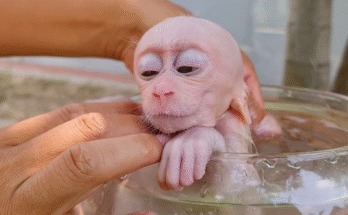When Bibi, an abandoned monkey, was found clinging to survival, her future seemed uncertain. Left alone in harsh conditions, she faced immense challenges. But hope arrived when a compassionate rescuer stepped in to transform her life. Bibi’s adoption journey wasn’t just about finding a home; it was about discovering love, trust, and care. From her first safe meal to learning to trust again, Bibi’s story is a testament to resilience and the power of second chances. This heartwarming tale captivates animal lovers and reminds us of the profound impact of kindness. Witness the journey that changed everything for Bibi.
The Journey of Rescue
Rescuing a baby monkey is a delicate and rewarding task. These animals, often displaced due to habitat loss, abandonment, or illegal wildlife trade, require immediate attention. When finding an abandoned or injured baby monkey, the first step is ensuring its safety. Assess its condition carefully, looking for signs of dehydration, injury, or malnutrition. If possible, contact a local wildlife expert or rehabilitation center to guide the next steps. Immediate actions like providing warmth and rehydration can save its life.
Understanding the Needs of Baby Monkeys
Baby monkeys are highly dependent creatures, needing constant care akin to human infants. They require a safe, clean, and stress-free environment. Their diet plays a crucial role in recovery and growth. In the absence of mother’s milk, formula designed for primates or goat’s milk can be a substitute. Ensure proper hygiene during feeding to prevent infections.
In addition to physical needs, baby monkeys require emotional care. They thrive on social interaction and affection. Providing them with soft toys or blankets can mimic the comfort of their mother. Gentle handling builds trust and helps reduce stress.
The Right Way to Provide Long-term Care
Caring for a rescued monkey involves creating a habitat that mimics their natural environment. This includes:
- Proper Diet: Incorporate fruits, vegetables, and protein sources into their meals as they grow.
- Enrichment: Provide toys, climbing structures, and activities to stimulate their mind and body.
- Health Monitoring: Regular check-ups with a veterinarian specializing in primates are essential. Vaccinations and parasite treatments should be up to date.
- Socialization: If possible, introduce the baby monkey to other monkeys to encourage natural behaviors.
Ethical Considerations
While caring for a baby monkey is fulfilling, it’s important to remember that these animals belong in the wild. The ultimate goal should be rehabilitation and release into their natural habitat. Keeping monkeys as pets is often discouraged as it can lead to behavioral issues and deprives them of a natural life.
Raising Awareness
Every rescue story is an opportunity to raise awareness about wildlife conservation. Sharing the journey of a rescued monkey can inspire others to support wildlife rehabilitation efforts. It highlights the importance of preserving natural habitats and protecting vulnerable species.
Conclusion
Rescuing and caring for a baby monkey is a journey of compassion and dedication. By understanding their needs and prioritizing their well-being, you can give them a second chance at life. Let’s work together to protect these incredible creatures and ensure they thrive in their rightful home—the wild.
Tiniest World Newborn Baby Monkey Hug Himself To Sleep Not Yet Accept New Home
Caring for a newborn monkey requires patience, knowledge, and attention to detail. These delicate creatures need a warm environment to regulate their body temperature, especially during the first weeks of life. Proper feeding is crucial; consult a veterinarian to ensure the formula matches their nutritional needs. Hydration and hygiene are equally important to prevent infections. Weak newborns may require extra care, including round-the-clock monitoring and gentle handling. Building trust through touch and communication is key to their emotional well-being. By providing the right care, you ensure the monkey’s healthy growth and create a strong bond for life.
1. Understanding the Basics of Newborn Monkey Care
Newborn monkeys are highly vulnerable and depend entirely on their caregivers for survival. Their natural mothers provide constant warmth, nourishment, and emotional support, which must be replicated in human care to ensure their well-being.
Key Characteristics of Newborn Monkeys:
- Fragility: Their bones are soft, and their immune systems are underdeveloped.
- Dependency: They require frequent feeding and consistent care.
- Behavior: They exhibit clingy behavior, mimicking their natural bond with their mothers.
2. Creating the Ideal Environment
Temperature and Warmth
Newborn monkeys cannot regulate their body temperature effectively. A warm, controlled environment is critical during the first few weeks of life.
- Optimal Temperature: Maintain a room temperature of 85-90°F (29-32°C) using heating pads or incubators.
- Avoid Overheating: Monitor the temperature to prevent heat stress.
- Skin-to-Skin Contact: If possible, provide skin-to-skin contact to mimic maternal warmth.
Safe Habitat
Prepare a secure and clean space to house the newborn monkey.
- Use a small, enclosed area with soft bedding.
- Ensure the habitat is free from sharp objects or choking hazards.
- Regularly clean and disinfect the area to prevent infections.
3. Feeding Newborn Monkeys
Proper nutrition is vital for a newborn monkey’s growth and development. Since they rely on their mother’s milk in the wild, replicating their natural diet is essential.
Formula Feeding
Consult a veterinarian to determine the most suitable milk formula. Common options include:
- Specialized Monkey Milk Replacers: These are designed to mimic the nutritional profile of monkey milk.
- Goat’s Milk: Often recommended due to its digestibility and nutritional content.
- Human Infant Formula: Used in emergencies but should be adjusted for protein and fat levels.
Feeding Schedule
Newborn monkeys require frequent feedings:
- 0-2 Weeks Old: Every 2-3 hours, including nighttime.
- 3-6 Weeks Old: Gradually reduce nighttime feedings.
- 6 Weeks and Beyond: Introduce solid foods while continuing milk feeds.
Feeding Techniques
- Use sterilized syringes or baby bottles with small nipples.
- Feed the monkey in an upright position to prevent choking.
- Monitor their weight regularly to ensure proper growth.
4. Ensuring Proper Hygiene
Hygiene is crucial to prevent infections in newborn monkeys, whose immune systems are still developing.
- Bathing: Use warm water and a mild, animal-safe soap for occasional baths.
- Cleaning: Wipe the monkey’s body daily with a damp cloth to remove dirt.
- Diapering: If using diapers, change them frequently to prevent skin irritation.
- Sanitation: Regularly clean feeding equipment and the living area.
5. Medical Care and Monitoring
Newborn monkeys require routine medical care to address potential health issues.
Veterinary Visits
- Schedule a check-up within the first week of bringing the monkey into care.
- Regularly monitor for signs of illness, such as lethargy, diarrhea, or poor appetite.
Vaccinations
Consult a veterinarian about vaccination schedules to protect against common diseases.
Common Health Concerns
- Dehydration: Ensure adequate fluid intake to prevent dehydration.
- Respiratory Issues: Keep the environment clean and warm to avoid respiratory infections.
- Parasites: Administer deworming treatments as prescribed by a vet.
6. Emotional and Social Needs
Newborn monkeys are social animals that thrive on emotional bonding and interaction.
Building Trust
- Spend time holding and cuddling the monkey to establish trust.
- Use gentle tones and avoid sudden movements to create a sense of safety.
Simulating Maternal Care
- Wrap the monkey in a soft cloth to simulate being held by their mother.
- Use a stuffed animal for the monkey to cling to when you are unavailable.
Encouraging Socialization
- Introduce the monkey to other compatible animals or caregivers when appropriate.
- Provide toys and activities to stimulate their cognitive development.
7. Transitioning to Solid Foods
As the monkey grows, gradually introduce solid foods to their diet.
Suitable Foods
- Fruits: Bananas, papayas, and mangoes are excellent options.
- Vegetables: Offer cooked carrots, sweet potatoes, and leafy greens.
- Protein Sources: Introduce boiled eggs, tofu, or small amounts of lean meat.
Feeding Tips
- Cut food into small, manageable pieces.
- Monitor for allergies or digestive issues.
- Continue providing milk alongside solids until the monkey is fully weaned.
8. Preparing for Independence
As the monkey grows older, encourage independence to promote healthy development.
Gradual Separation
- Reduce the time spent holding the monkey to foster self-reliance.
- Encourage exploration within a safe environment.
Teaching Natural Behaviors
- Allow the monkey to climb and play to develop motor skills.
- Introduce them to natural foraging techniques using hidden treats.
9. Ethical Considerations in Newborn Monkey Care
Caring for a newborn monkey comes with significant ethical responsibilities.
Legal Compliance
- Ensure you have the necessary permits and licenses to care for the monkey.
- Follow local wildlife protection laws and regulations.
Long-Term Commitment
- Understand that caring for a monkey is a long-term commitment requiring time, resources, and dedication.
Conservation Awareness
- Avoid supporting illegal wildlife trade or exploitation.
- Contribute to conservation efforts by educating others about the importance of protecting monkey habitats.
10. Frequently Asked Questions
How often should I feed a newborn monkey?
Newborn monkeys should be fed every 2-3 hours, including nighttime feedings, during the first two weeks of life.
What should I do if the monkey refuses to eat?
If the monkey refuses to eat, check the temperature of the milk, ensure the feeding equipment is clean, and consult a veterinarian if the problem persists.
Can I raise a newborn monkey as a pet?
Raising a monkey as a pet is not recommended due to their complex needs and the ethical concerns surrounding wildlife care. Always consult with experts and consider alternatives like wildlife sanctuaries.
Conclusion
Caring for a newborn monkey is a rewarding but challenging responsibility that demands time, dedication, and knowledge. By providing proper nutrition, a safe environment, emotional bonding, and medical care, you can help ensure their healthy growth and survival. Always prioritize ethical practices and consider the long-term welfare of these incredible creatures. With the right care and commitment, you can make a significant difference in the life of a newborn monkey.



